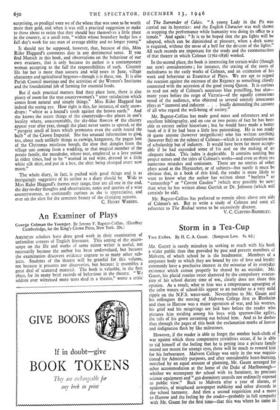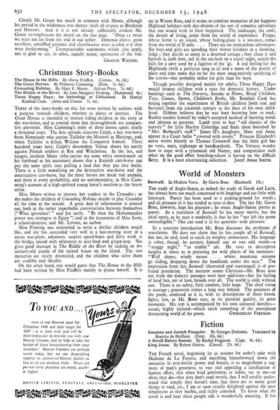Storm in a Tea-Cup
Two Exiles. By H. C. A. Gaunt. (Sampson Low. Ss. 6d.) MR. GAUNT is surely mistaken in seeking to reach with his book a wider public than that provided by past and present members of Malvern, of which school he is the headmaster. Members of a corporate body to which they are bound by ties of love and loyalty commonly have a preclusive interest in the minutiae of its everyday existence which cannot properly be shared by an outsider. Mr. Gaunt, his placid routine twice shattered by the compulsory evacua- tion of his school durine time of war, clearly does not share this opinion. As a result, what to him was a tempestuous upsurging of the calm waters of school-life appear to an outsider as a very mild ripple on the N.F.S. water-tank. Nevertheless to Mr. Gaunt and his colleagues the moving of Malvern College first to Blenheim and then to Harrow was a major operation of war, and his worries, his grief and his misgivings are laid bare before the reader who pictures him striding among his boys with sparrow-like agility, the tails of his gown streaming out behind him. And as he dashes thus through the pages of this book the exclamation marks of horror and indignation flash by like milestones.
However, if the reader is able to forget the sombre back-cloth of war against which these comparative trivialities occur, if he is able to rid himself of the feeling that he is prying into a private family record not meant for strange eyes, there will be much to reward him for his forbearance. Malvern College was early in the war requisi- tioned for Admiralty purposes, and after considerable heart-burning, matched by an equal amount of planning, Mr. Gaunt arranged for other accommodation at the home of the Duke of Marlborough— whither we accompany the school with its furniture, its precious science equipment and " 450 dormitory utensils not ordinarily exposed to public view." Back to Malvern after a year of alarms, of epidemics, of misplaced newspaper publicity and other discords in the school harmony. And then a second requisition and a move to Harrow and the feeling by the reader—probably in full sympathy with Mr. Gaunt for the first time—that this was where he came in.
Clearly Mr. Gaunt has much in common with Moses, although his period in the wilderness was shorter (with all respect to Blenheim and Harrow). And if it is not already sufficiently evident Mr. Gaunt re-emphasises the moral on the last page. " Once c r twice we were not far from the end of our tether. Immense efforts. great sacrifices, unruffled patience and cheerfuiness were needed and they were forthcoming." Unimpeachable sentiments which also apply, one is glad to say, to other, equally major, operations of the war.
GRAHAM WATSON.



































 Previous page
Previous page